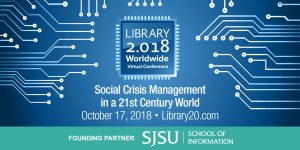In early February, 2012, I attended an Ontario Library Association conference session on the topic of interview skills. The presentation was given by a public librarian, Yvonne Patch, from the Hamilton Public Library, and an academic librarian, Jim Brett, of the University of Guelph Library. The session was informative and the presenters’ recommendations are an excellent starting point to kick off your job search and develop your interview skills. These tips will help you prepare to interview for positions within many different information environments. Here is a summary of some of Patch and Brett’s suggestions.
What Employers Want
Employers seek candidates who can demonstrate the following competencies:
- Communication skills
- Customer service skills
- Leadership potential
- Sound judgment and decision-making ability
- Knowledgeable
- Project management skills
- A self-starter who is results oriented
If you don’t have a lot of library experience, use transferable skills you’ve developed at other jobs as a starting point. And if you don’t have much work experience at all, think about how you’ve developed these skills in your MLIS classes, or through volunteer positions or internships. And if you haven’t yet completed an internship, start looking into potential opportunities now. No, completing an internship is not required for graduation, but it will absolutely help you to develop professional skills in a professional environment. Have you participated as a leader in group projects, either formally or informally? This is the kind of example that can potentially demonstrate project management, communication, and leadership skills.
Getting Started
To start preparing for jobs before you even think of applying for one, take a look at yourself, your abilities, and your work history. Complete a skills assessment and a self assessment, and create one master resume that lists all of your experience and skills. Then, when it comes time to apply for jobs, tailor the resume so that it highlights the skills that match those listed in the job description.
Before you apply for a job, make sure you understand the job description, find out about the employer, and think about who would act as a reference for you. Don’t just apply for any job, anywhere. Focus your search based on the information you gleaned during your skills assessment and self assessment.
Interviewing 101
So, you’ve applied for the perfect job and have been invited to participate in an interview. Success! Well, not quite. First you need to prepare for the interview. Here are the qualities that interviewers want to see, so be ready to demonstrate the following characteristics:
- Preparation: Don’t show up with a stack of papers and flip through them while answering questions. Also, make sure you’re able to demonstrate sound knowledge about the job and the organization.
- Professional demeanor and appearance: Make an effort!
- Enthusiasm: Be enthusiastic about the opportunity of working for the organization you’re interviewing with; if you’re honestly not enthusiastic about the job, then it’s probably not the job for you and you shouldn’t waste everybody’s time by accepting the interview. If you’re just looking to gain interview experience, this is not the best way to achieve that objective.
- Energy: Don’t lethargically answer questions and for goodness’ sake, don’t yawn (even if you’re completely exhausted and forgot to have your morning coffee!).
- Critical thinking and analysis: This should be easy–after all, you’ve successfully completed graduate school! Demonstrate your ability to engage in graduate-level thinking and speaking.
Finally, remember that the interviewers are looking for someone who can succeed in their organization. Tell them stories that illustrate how you will fit in, contribute, and thrive in their work environment, and make sure you tell your stories with confidence and personality. That being said, don’t go overboard; be confident, not over-the-top.
One important thing to note is that you will rarely be asked a set of simple, closed questions. The interviewers will pose open-ended, behavioral based questions that are intended to elicit your behavior in a given situation. Make sure you have examples of situations or experiences ready to discuss along with any actions you took, and the outcome or end result of each situation. If you share a story in which you would change the outcome or result, talk about that to some extent. But don’t tell a story that makes you look bad, even if it was in the past.
Finally, be prepared to give a presentation. It is quite common in both public and academic libraries that you will be required to give a sample presentation as part of the interview process. Think of this presentation as another opportunity for engagement, and even if you’ve already spent four hours participating in interview-related activities and you’re feeling tired, be sure to keep up the enthusiasm and energy for this part of the process.
Never do this! (And I mean, NEVER)
There are a number of actions to never, ever take when on the job hunt. Here are a few to keep in mind:
- Don’t ignore the instructions in the job posting. If the posting asks you to submit your cover letter in the body of the e-mail, don’t submit a separate attachment, or if you are asked to contact Librarian A, don’t contact Librarian B.
- Never contact the Chief Librarian directly. This almost goes without saying, right?
- Don’t visit the branch and engage the staff in non-contextualized conversations to “get the dirt”; you’ll always find unhappy library workers and, besides, the opinions of virtual strangers shouldn’t be a determining factor in whether or not you’ll apply for a job.
- Don’t name drop–it can work against you!
These interview tips and suggestions should help you achieve success as you search for work and volunteer opportunities. And if you’re not offered the first job you apply and interview for, don’t despair! Just think of each interview as getting you one step closer to where you really should be.
For further information, check out Yvonne Patch and Jim Brett’s PowerPoint slides from the conference session as well as the SJSU SLIS Career Development resources I’ve linked to throughout this article. Best of luck with your job search!
__
Stacey lives in Toronto, Ontario, Canada, and works as a library assistant for the Toronto Public Library. She started the MLIS program in Fall 2009 and is mere weeks away from graduating. She is presently working on her e-Portfolio, completing a virtual internship with SJSU’s King Library, and is Editor-in-Chief of the Student Research Journal. In her spare time, she drinks copious amounts of coffee, wrangles her almost-three-year-old daughter, and looks forward to a summer not spent studying.


